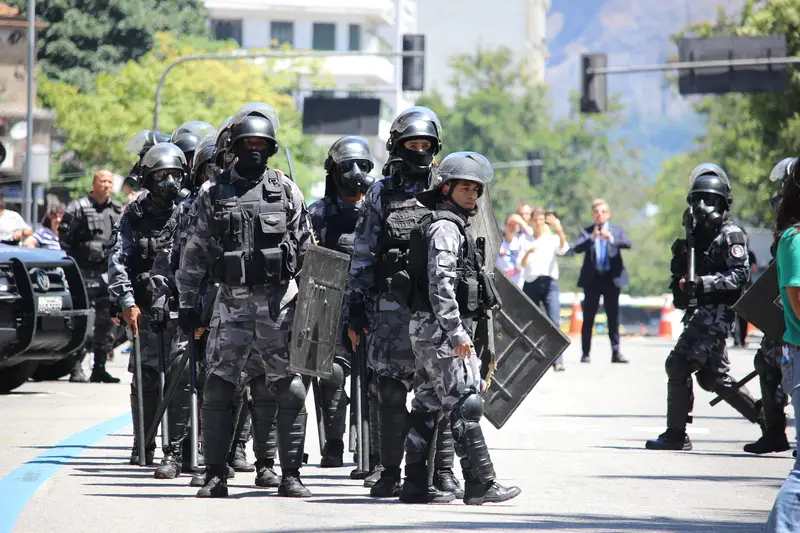A massive police operation in Rio de Janeiro on Tuesday, October 28, 2025, left at least 132 people dead, making it the deadliest raid in the Brazilian city’s history and sparking international outcry over the use of force. The military-style operation involving approximately 2,500 security personnel targeted the notorious Comando Vermelho, or Red Command, criminal organization in the northern favelas of Complexo do Alemão and Penha.
Among the dead were suspected gang members and four police officers, according to state authorities. Rio de Janeiro’s public defender’s office disputed a lower count, placing the death toll at 132. The operation, dubbed “Operation Containment,” aimed to prevent the Red Command from expanding its territorial control over drug trafficking and other illicit activities in the impoverished communities.
The raid unfolded with helicopters, armored vehicles, and officers on foot descending on the favelas, where they encountered fierce resistance. Police reported coming under attack from gang members using explosive-laden drones and heavy gunfire. The violence paralyzed large sections of the city throughout the day, forcing schools to close, prompting a local university to cancel classes, and bringing transportation to a halt as buses were commandeered to barricade roads.
According to authorities, officers arrested 113 people during the operation and seized 118 weapons along with more than a ton of drugs. The Red Command, which originated in Rio’s prison system decades ago, operates as what crime journalists describe as a franchise system, with local leaders serving as business partners in drug trafficking, gun smuggling, and other illegal enterprises.
The day following the raid, residents from Penha retrieved dozens of bodies from a wooded hillside and laid them in the neighborhood’s main square. Photographer Bruno Itan, who witnessed the grim scene, described bodies arriving throughout the night. He recounted seeing residents searching the area for missing relatives, then placing the recovered remains in a public square where grieving families gathered.
Questions arose immediately about the condition of the bodies and the circumstances of the deaths. Multiple witnesses reported seeing corpses with knife wounds, stab marks, and signs of mutilation. One mother, Raquel Tomas, told reporters her 19-year-old son had been decapitated, with his head hung from a tree. Local activist Raull Santiago reported finding approximately 15 bodies before dawn, noting evidence of execution-style killings, including shots to the back and head, as well as victims who appeared to have been restrained.
Rio state Governor Claudio Castro defended the operation, characterizing Red Command members as narcoterrorists and calling the fallen officers heroes. He insisted those killed were criminals engaged in armed conflict in a wooded area where civilians would be unlikely to venture. “I don’t think anyone would be walking in the forest on the day of the conflict,” Castro stated at a news conference. Police secretary Felipe Curi claimed residents had tampered with evidence by removing camouflage clothing and weapons from bodies.
President Luiz Inácio Lula da Silva expressed horror at the death toll, according to Justice Minister Ricardo Lewandowski, who noted the federal government had no advance knowledge of the operation. United Nations Secretary-General Antonio Guterres conveyed concern through his spokesman, emphasizing that police use of force must adhere to international human rights standards and calling for a prompt investigation.
Brazil’s Supreme Court Justice Alexandre de Moraes summoned Castro to a hearing scheduled for the following Monday to provide detailed explanations of the police actions. The Senate’s human rights commission requested clarifications, while prosecutors demanded proof that no less harmful alternatives existed to achieve the operation’s objectives.
In response to the violence, hundreds of favela residents gathered Wednesday outside the state government headquarters, chanting “assassins” and waving Brazilian flags stained with red paint. Domestic worker Barbara Barbosa, whose son died in a previous Penha operation, questioned whether residents faced a de facto death sentence.
Cardinal Orani João Tempesta, Archbishop of Rio de Janeiro, called for peace and protection of human life in the aftermath. He emphasized that life and human dignity represent absolute values, urging collective soul-searching rather than hatred or indifference in response to the tragedy.
The operation occurred as Rio prepares to host the C40 World Mayors Summit and Prince William’s Earthshot Prize on Nov. 4, though state security officials denied any connection between the raid and the upcoming international events. Police operations resulting in deaths occur frequently in Rio, with approximately 700 people killed during such actions in 2024 alone, averaging nearly two per day.











